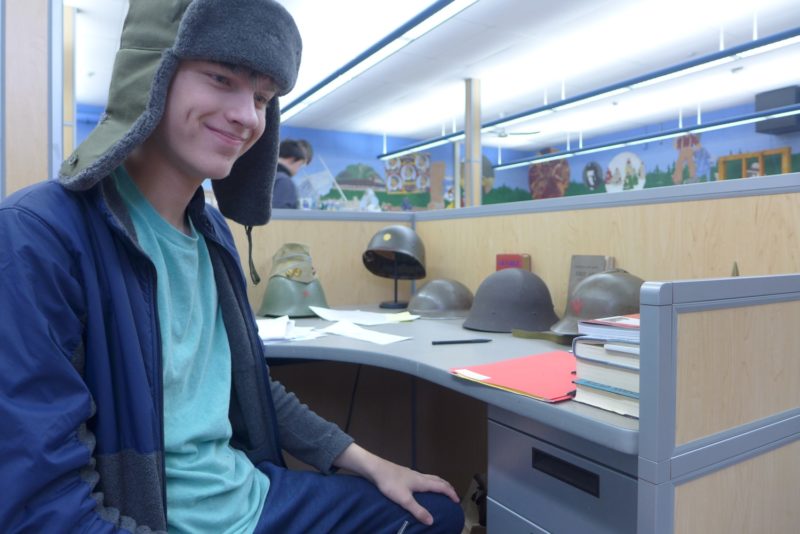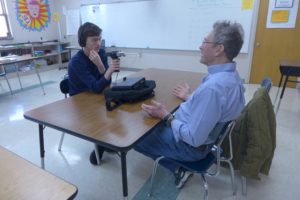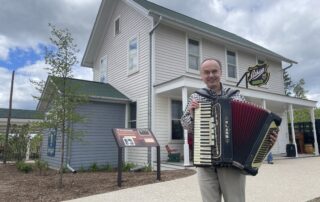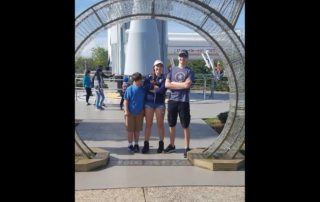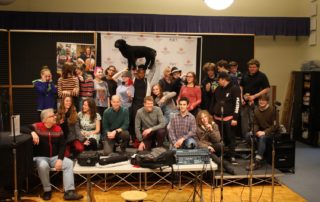When you walk into a classroom at Monona Grove Liberal Arts Charter School, there’s one desk that stands out. It’s lined with vintage military helmets, all purchased by MG21 student Harrison Farnam. Harrison is passionate about political and military history. WPR’s Maureen McCollum interviewed him about his interests.
Maureen McCollum: So Harrison, I see your desk decor is quite unique. Can you tell me what you have on display?
Harrison Farnam: You have a couple of helmets from various time periods. I think the newest one is probably this one which is from the 1970s. It’s a Hungarian helmet from the Cold War. But I have helmets here from the 1920s all the way up to the 1970s.
I kind of got into this because…I don’t really know.
Maureen: It just hit you one day?
Harrison: Well kind of. Actually, I had a replica helmet and I’m like, “It’d be cool if I had the real thing.”
I babysit, on the weekends and over summers and stuff. My mom and my dad have jobs, so they’re gone for 10 hours and I get paid seven dollars an hour. So that’s how I buy these.
Maureen: Are there certain helmets that you like? Are you going for shape, are you going for history, or where they served?
Harrison: Kind of a combination of three. I really like the shape of this one, which is from the Soviet Union and they use that for about three years before it was phased out.
Maureen: Did your family serve in the military?
Harrison: As far as I know, I have three [relatives] that served in the military. I have one that served in the National Guard in Illinois. One who served in Vietnam. And one issue who…he was a captain of supply ship during World War II. I never got to meet him because he died right before I was born. But I am named after him.
Maureen: Oh, that’s really nice. When we first started this project, you said you wanted to do like an historical essay on early military history you ended up doing something on World War I and Franz Ferdinand. Why are you drawn to that era of military history?
Harrison: At the turn of the century, there’s a lot of rapid development. It’s weird to see the evolution of military tactics and there’s a lot of politics tied up into it, too.
Maureen: So do you want to pursue a career in the military or history?
Harrison: What’s interesting to me right now is there are groups of people who go out to the forest where battles were fought. They go with metal detectors and they dig up these old helmets and stuff like that.
It’s a really noble thing because some of these people here aren’t scavengers. They’re people who go out there and metal detect and they try to find the bodies of soldiers who have been missing to provide some closure for families. And they found this pilot who’s been missing for, like, 70 years. Since the cockpit hadn’t really broken that much, his identity capsule had been preserved. They’re able to find out, “Oh this is the guy we’ve been looking for!” And his personal belongings were still there and was it was an incredible thing to see.
Maureen: That’s amazing. So dream job for you?
Harrison: Kind of. Either that or, like, media production.
==
After learning about Harrison’s love of military history and possible interest in media, we helped connect him with a local veteran.
This was Harrison’s first time interviewing a veteran in person. He ended up telling his teacher, Ian Lowe, that it was one of the highlights of his high school career.
The following text is part of his conversation with Bob Cook, a retired Madison Vet Center Team Leader and veteran of the Vietnam War who primarily served with the 55th Medical Group.
(🔊Audio is the full conversation between Harrison Farnam and Bob Cook🔊)
Harrison Farnam: So you served in Vietnam. Would you like to say what province or provinces you served in?
Bob: Well, I served in II Corps and Pleiku and with the 71st Evac Hospital.
I had got a branch transfer from the Infantry to the Medical Service Corps and I’m probably here today because that branch transfer went through. I graduated as an infantry officer and generally as an infantry officer, you have to serve two years in your branch before they allow you to do a transfer. But at that point in time, I went into graduate school immediately afterwards and had gotten a Master’s in Counseling.
This is 1965, 1966. And everybody and their brother was going to Vietnam. No matter what we tried to do to avoid it.
So I requested a branch transfer and I got a branch transfer. I feel very fortunate about that because the kill rate of infantry lieutenants is very high in Vietnam.
Harrison: You said you had friends in the infantry at the time. Do you know what happened to them, if you would like to speak about that?
Bob: That’s a good question. One of my friends in ROTC was killed in Vietnam as a helicopter pilot. He went to the same high school I did down in Champaign, Illinois.
You know, occasionally you pull out that yearbook you had from summer camp and you look at it. I’ve wondered how many of these guys actually served in Vietnam and how many survived. I don’t know the answer to that.
Harrison: What was going home like?
Bob: Going home, it was a mixed bag in some ways. You were anxiously wanting to get out there and not be killed walking to the plane, which did happen to folks.
And there’s always the issue of… It’s kind of like a team and you’re leaving the team. In our case, we weren’t killing people, but we were in an organization that was keeping people alive and moving them out. So you had a sense you doing something valuable.
Harrison: Is there anything you would like to say before we wrap this up?
Bob: Many folks who went to Vietnam were not believers in the war, but they served honorably there and did their jobs.
If you’re in a combat zone, there was no politics in a combat zone. I mean if you’re out in the field there is. They could argue in a hospital where there are politics. We had doctors arguing whether it was right to treat the Vietnamese or not. One saying they should, one say not.
Out in the field, guys work together as a team and served in that kind of capacity, knowing that what they did out there was critical over and keeping each other alive.
And this is tough. They didn’t deserve the treatment they got coming home. That’s all.
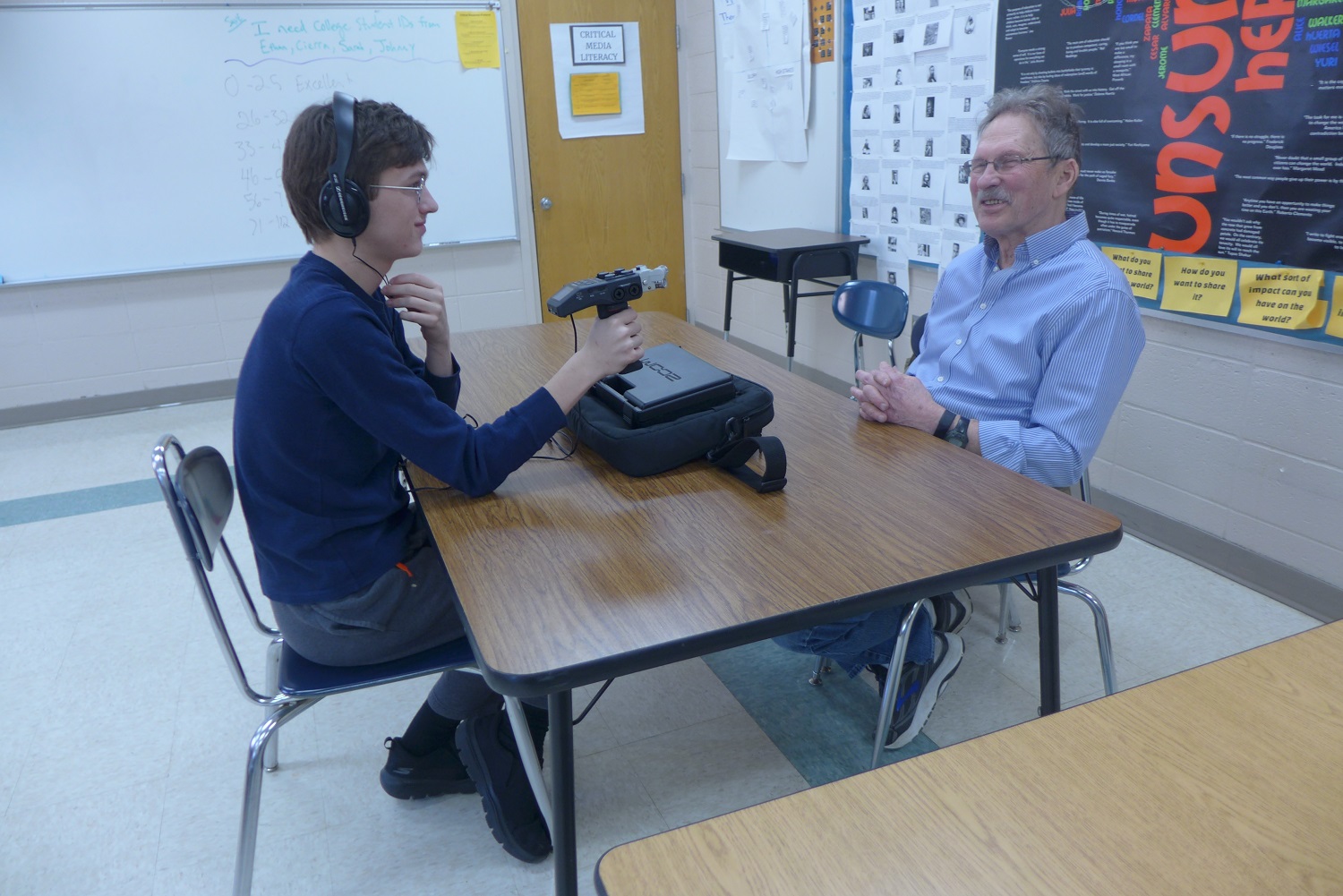
Harrison Farnam said interviewing Vietnam veteran Bob Cook was one of his best experiences in high school. (Maureen McCollum/WPR)
==
For Harrison’s first radio project earlier in the school year, he decided to record some thoughts about Franz Ferdinand. What don’t we know about the Archduke of Austria? Why was he assassinated? What happened on that fateful day leading up to WWI? Harrison has the answers.
Hear from more MG21 students throughout the year on “Wisconsin Life” and on the special, “Classroom Frequency: Student Voices From Wisconsin.”
